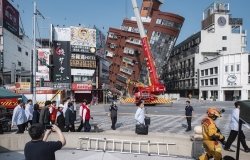The "Creativity Problem" and the Future of the Japanese Workforce
Misao Hayakawa,Professor of Education, Nagoya University; Gerald Hane,Founding General Partner, Q-Paradigm and Former Head of International Strategy, White House Office of Science and Technology Policy; Akiko Hashimoto, Associate Professor of Sociology and Asian Studies, University of Pittsburgh. Commentator: Anne Imamura,Area Studies Division Director, Foreign Service Institute. Click here to read Special Report #121.
Overview
Misao Hayakawa,Professor of Education, Nagoya University; Gerald Hane,Founding General Partner, Q-Paradigm and Former Head of International Strategy, White House Office of Science and Technology Policy; Akiko Hashimoto, Associate Professor of Sociology and Asian Studies, University of Pittsburgh. Commentator: Anne Imamura,Area Studies Division Director, Foreign Service Institute.
Click here to read Special Report #121.
In order to boost national competitiveness, the Japanese government has launched a variety of reforms designed to foster innovation. From giving schoolchildren "room to grow" to deregulating entrepreneurial activity, the government and many in the private sector hope to solve Japan's so-called "creativity problem."
According to Akiko Hashimoto the problem stems partly from the hierarchical system still deeply embedded in Japanese society, which favors older men and stifles criticism and innovation. She criticized the government for the paternalistic tone that accompanies reform efforts. The Ministry of Education is attempting to encourage creativity through rules and regulations—it wants to "mold" young people into freethinking individuals. Such an approach cannot succeed, Hashimoto declared. Instead, young people must be taught to question authority and orthodox thinking, including that of the Ministry of Education.
Misao Hayakawa also expressed desire for more creativity in the schools. But he maintained that meaningful creativity can only be born of high academic achievement—it cannot be fostered in the current environment of falling math and language skills. He warned the educational gap between Japanese and Chinese students is narrowing. While he agreed with Hashimoto that Japanese students are disengaged—for example, an increasing number refuse to attend school—he recommended tougher standards and curricula as at least part of the solution. He warned against the polarization of society between high achievers and low achievers that seems to be accompanying the growing competitive market orientation in education.
Gerald Hane painted a much rosier picture of the future. Focusing on economic (rather than educational) reforms, he pointed out that the government has removed many obstacles to innovation in business by, for example, facilitating direct financing and improving pension portability. If Japan continues to deregulate, it will find there are many creative individuals ready to take advantage of opportunities. In the immediate post-War period, many pioneering industrialists and inventors proved that Japanese culture is not inherently antithetical to entrepreneurship. However, in the decades that followed, incentives for taking risks declined drastically.
Anne Imamura served as commentator, and recommended that Japan not seek national solutions to the creativity problem. Rather, the government should allow multiple programs to flower and let them "play themselves out." She warned against evaluating the results of educational reform too soon, and against favoring high achievers at the expense of middle achievers.
Robert Hathaway, Asia Program Director, 691-4012
Drafted by Amy McCreedy
Hosted By

Indo-Pacific Program
The Indo-Pacific Program promotes policy debate and intellectual discussions on US interests in the Asia-Pacific as well as political, economic, security, and social issues relating to the world’s most populous and economically dynamic region. Read more
Thank you for your interest in this event. Please send any feedback or questions to our Events staff.










